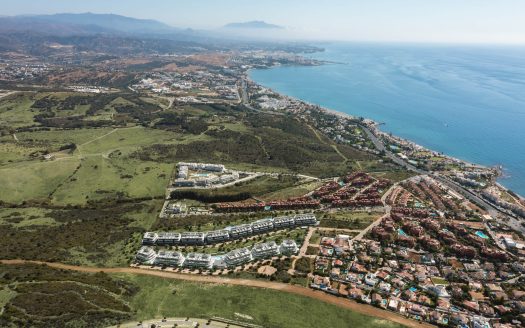The complete guide to investing in Spanish real estate: maximize returns and minimize risk
Table of contents
- Introduction: why invest in Spanish real estate?
- Advantages of investing in Spanish real estate
- Important statistics about the real estate market in Spain
- Roadmap for investing in Spanish real estate
- Maximizing returns and minimizing risk when investing in Spanish real estate
- Tips for buying property in Spain
- Popular locations for real estate investment in Spain
- How to find the right real estate agent when investing in Spanish real estate?
- Taxes and legal aspects when investing in Spanish real estate
- Financing options for investing in Spanish real estate
- Common mistakes and pitfalls when investing in Spanish real estate
- Practical information for investing in Spanish real estate
- Return calculation when investing in Spanish real estate
- Conclusion: Why Spanish real estate can be a good investment
- Contact
- Box 3
Introduction: why invest in Spanish real estate?
Investing in Spanish real estate is an attractive option for both private and professional investors because of its many advantages. Spain is a country with a rich culture, a pleasant climate and a growing economy, factors that directly and indirectly make the real estate market attractive to investors. Moreover, the country ranks among the best real estate investments in Europe.
One of the main reasons to invest in Spanish real estate is the opportunity to benefit from rising house prices and rental income. The Spanish real estate market has experienced steady growth in recent years, providing a favorable investment climate.
Moreover, Spain offers an excellent lifestyle, with beautiful beaches, historic cities and vibrant nightlife. This makes it an attractive destination not only for tourists, but also for expats looking for a new home base.

Advantages of investing in Spanish real estate
Investing in Spanish real estate offers numerous advantages, including:
- Potentially high returns: The Spanish real estate market has experienced significant price appreciation in recent years, allowing investors to benefit from the increase in value of their assets.
- Stable rental income: In popular tourist areas such as the Costa del Sol and the Canary Islands, there is a constant demand for vacation homes, resulting in stable rental income for investors. This is among other reasons why INVESTINSPAIN is therefore active in these regions.
- Favorable tax environment: Spain offers a favorable tax environment for foreign investors, with low income tax rates and opportunities for tax breaks.
- Diverse investment opportunities: From apartments and villas to commercial properties and estates, Spain offers a wide range of investment opportunities for every budget and preference.
- Lifestyle and culture: Spain is known for its excellent lifestyle, beautiful beaches, rich culture and vibrant nightlife, making it an attractive destination for investors and tourists alike.
Important statistics about the real estate market in Spain
To better understand the Spanish real estate market, it is important to review some key statistics:
- The average house price in Spain increased by 7.3% in 2022, according to data from the Spanish Ministry of Public Works.
- In popular tourist areas such as the Costa del Sol and the Balearic Islands, prices have risen more than 10% in recent years.
- Rents in Spain rose an average of 4.5% in 2022, according to data from the Spanish Institute of Statistics (INE).
- More than 600,000 homes were sold in Spain in 2022, up 14.5% from 2021.
- Foreign buyers accounted for about 15% of total home sales in Spain in 2022.
These statistics show that the Spanish real estate market is in an upward cycle, providing favorable conditions for investors seeking appreciation and stable rental income.
Roadmap for investing in Spanish real estate
If you are considering investing in Spanish real estate, it is important to take a structured approach. Here is a roadmap that can help you navigate the investment process:
1. Determine your goals and budget: Set clear goals for your investment, such as capital appreciation, rental income or a combination of both. Also determine your available budget and how much you are willing to invest.
2. Research the market: Study the different regions and cities in Spain to find the most suitable location for your investment. Analyze factors such as house prices, rents, tourist demand and economic growth.
3. Choose the right type of property: Decide whether you want to buy an apartment, villa, commercial property or another type of property. Also consider whether you want to purchase a new construction project or an existing property.
4. Seek professional help: Work with a reliable and experienced real estate agent who specializes in the Spanish real estate market. They can help you find the right property and navigate through the purchase process. Also, choose a real estate agent who specializes in a particular region. Real estate agents selling properties throughout Spain, the fourth largest country in Europe, are rarely well informed about all these regions and the plethora of projects available there. Consequently, they cannot provide the best possible service.
5. Get the right financing: Research different financing options, such as a mortgage or a loan from a Spanish bank. Make sure you understand the proper documents and requirements for financing. By the way, a good real estate agent will put you in touch with tax specialists.
5. Complete the purchase: After you have found the right property, complete the purchase according to the laws and regulations in force in Spain. Be sure to hire legal and financial experts to ensure the process goes smoothly. Again, an experienced real estate agent can help you with this.
6. Manage your investment: After the purchase, you need to manage your property effectively, either by renting it out yourself or by hiring a professional management agency. So keep monitoring market conditions and returns even after the purchase.
By following this roadmap, you can take a structured and confident approach to the Spanish real estate investment process.
Maximizing returns and minimizing risk when investing in Spanish real estate
Investing in Spanish real estate can be lucrative, but it is also important to understand the risks and implement strategies to maximize your returns and mitigate your risks. Here are some tips:
1. Diversification: Spread your investments across different regions, cities and property types to spread your risk and optimize your returns.
2. Location, location, location: Choose the right location for your investment, considering factors such as tourism demand, infrastructure, amenities and economic growth.
3. Optimize rental income: Rent out your property in a smart way, such as through vacation rentals in tourist areas or long-term rentals in cities with constant demand.
4. Cost control: Carefully manage your costs, such as maintenance, taxes and management fees, to maximize your net return. This will also help you avoid having to sell your property early (at a sub-optimal time) due to unforeseen costs.
5. Legal and tax advice: Work with experts in legal and tax matters to ensure you meet all legal requirements and take advantage of any tax benefits. A good real estate agent will have the right contacts for this.
6. Market Analysis: Keep a close eye on local and national real estate markets to respond to changes and identify opportunities in a timely manner. Again, a good real estate broker can be helpful. After all, they keep their clients informed about the most interesting projects with the most potential for investors.
7. Risk management: Implement risk management strategies such as obtaining appropriate insurance and building an emergency reserve for unexpected expenses.
By applying these strategies, you can significantly increase your chances of success when investing in Spanish real estate while reducing your risks.
Tips for buying property in Spain
If you are considering buying property in Spain, here are some valuable tips to make the process go smoothly:
1. Do extensive research: Thoroughly study different regions, cities and neighborhoods in Spain to find the best location for your investment. Analyze factors such as house prices, rental prices, tourist demand and infrastructure.
2. Work with local experts: Enlist the help of a reliable and experienced real estate agent who specializes in the Spanish real estate market. They can help you find the right property and navigate through the purchase process.
3. Understand legal and tax issues: Make sure you fully understand the legal and tax laws in Spain. Consider hiring a lawyer and tax advisor to guide you. As mentioned earlier, a good real estate agent can put you in touch with these.
4. Arrange financing: Research different financing options, such as mortgages and loans from Spanish banks. Make sure you understand the required documents and procedures.
5. Visit the property in person: If possible, visit the property in person before making an offer. This will allow you to assess the location, condition of the property and surrounding area. For new construction/off plan properties, it may also be helpful to visit the local sales office with a real estate agent. This will give you a better idea of the location, views and materials even though the property is not yet there.
6. Consider all costs: In addition to the purchase price, consider other costs such as transfer tax, notary fees and any renovation costs. Monthly fixed costs of the home are also important to consider.
7. Understand rental laws: If you plan to rent out your property, make sure you understand the rental laws in Spain, including the rights and obligations of landlords and tenants. Also look at possible changing legislation at home as well as in the region in which you intend to buy.
8. Consider a management agency/property management office for rentals: If you don’t live in Spain or want to spend a lot of time managing your property, consider using a professional management agency.
By following these tips, you can take a structured and confident approach to the property purchase process in Spain, allowing you to take advantage of the many benefits the Spanish real estate market has to offer.
Popular locations for real estate investment in Spain
Spain is a country with a variety of attractive locations for real estate investment, each with their own unique characteristics and advantages. Here are some popular locations worthy of attention:
1. Costa del Sol: This coastal region in southern Spain is a popular destination for tourists and expats, with beautiful beaches, a favorable climate and a vibrant lifestyle. Cities such as Marbella, Málaga and Estepona offer excellent opportunities for investing in vacation homes and apartments, but lesser-known regions also attract numerous tourists each year and can therefore be promising for your returns. Investing property Costa del Sol is thus a popular choice for investors.
2. Barcelona: The cosmopolitan city of Barcelona is a popular destination for investors because of its rich culture, architecture and vibrant economy. Both residential and commercial real estate offer opportunities here.
3. Madrid: The capital of Spain is a bustling metropolis with a strong economy and constant demand for housing, making it an attractive location for investors looking for stable rental income.
4. Balearic Islands: The Balearic Islands, with Mallorca and Ibiza as highlights, is a popular destination for tourists and expats. There are excellent opportunities here for investing in vacation homes and apartments overlooking the Mediterranean Sea.
5. Canary Islands: This volcanic archipelago off the coast of Morocco offers a subtropical climate and beautiful beaches, making it a popular destination for investors looking for vacation homes and apartments.
6. Valencia: This coastal city in eastern Spain is an emerging hotspot for real estate investment, with a vibrant culture, beautiful beaches and a growing economy.
7. Andalusia: This southern region of Spain is known for its rich history, beautiful architecture and vibrant cities such as Seville and Granada, making it an attractive destination for investors seeking culture and authenticity. The previously mentioned Costa del Sol is also part of Andalusia. Investing property Southern Spain continues to gain popularity among investors and second-home buyers.
When choosing the right location for your real estate investment in Spain, it is important to consider factors such as tourist demand, infrastructure, economic growth and your personal preferences.
How to find the right real estate agent when investing in Spanish real estate?
Finding the right real estate agent is critical to a successful real estate investment in Spain. A reliable and experienced real estate agent can help you navigate the complex real estate market, find the right property and make the purchase process go smoothly. Here are some tips for finding the right real estate agent:
1. Local expertise: Look for brokers who specialize in the specific region where you want to invest. Local expertise is invaluable because they are familiar with local market conditions, laws and regulations.
2. Experience and reputation: Research the broker’s experience and reputation. Read online reviews, ask for recommendations from other investors and check if the broker is a member of a professional organization.
3. Language Skills: If you are not fluent in Spanish, it is important to find a real estate agent who is fluent in English or your native language. This will facilitate communication and avoid misunderstandings.
4. Professional network: A good broker has an extensive professional network of lawyers, tax advisors, financial institutions and other professionals involved in the real estate investment process.
5. Full service package: Consider a broker who offers a full service package, including help finding the right property, negotiations, legal and financial guidance and possibly management services.
6. Personal click: Although it is a business relationship, it is important that you have a good personal click with your real estate agent. Good chemistry and basis of trust will facilitate cooperation.
7. Transparency and ethics: Look for a broker who is transparent and ethical in his or her practices. They should be open and honest about fees, commissions and any conflicts of interest.
By following these tips and taking the time to find the right real estate agent, you can ensure that your property investment in Spain goes smoothly and successfully.
Taxes and legal aspects when investing in Spanish real estate
When investing in Spanish real estate, it is crucial to thoroughly understand the tax and legal aspects. Spain has specific laws and regulations that may affect your investment, and it is essential to know them to avoid problems and unexpected costs.
Taxes
As a foreign investor in Spanish real estate, you must consider various taxes, including:
1. Transfer Tax (Impuesto sobre Transmisiones Patrimoniales – ITP): This tax is levied on the purchase of real estate and varies between 6% and 11%, depending on the region.
2. Annual property tax (Impuesto sobre Bienes Inmuebles – IBI): This is an annual tax levied based on the assessed value of your property.
3. Income tax: If you receive rental income from your Spanish real estate investment, you must pay income tax on it. Rates vary depending on where you live and other factors.
4. Wealth tax: Foreign owners of Spanish property may be subject to wealth tax on the value of their property.
It is advisable to consult an experienced tax advisor to ensure that you meet all tax obligations and take advantage of any tax benefits. Also make the comparison between home and Spanish taxes.
Legal aspects
In addition to taxes, you must also consider various legal aspects when investing in Spanish real estate, including:
1. Transfer of property: The transfer of property in Spain must be formalized with a notary (who, by the way, does not have the same obligations as in Belgium and the Netherlands, for example, in Spain the lawyer protects the interests of the buyer). It is important to have all the required documents and to follow the correct procedures.
2. Rental Law: If you plan to rent out your property, you must understand Spanish rental laws, including the rights and obligations of landlords and tenants.
3. Building permits: If you plan to do any remodeling or renovations, you need to make sure you have the proper building permits.
4. Ownership structures: Consider different ownership structures, such as individual ownership, joint ventures or ownership through a corporation, and understand the pros and cons of each option.
It is highly recommended that you consult an experienced attorney who specializes in Spanish real estate law. They can guide you through the legal landscape and ensure that your investment meets all legal requirements.
Financing options for investing in Spanish real estate
For many investors, financing is a crucial factor when investing in Spanish real estate. Fortunately, Spanish banks and financial institutions offer several options for financing your real estate investment. Here are some common financing options:
1. Mortgages: As in most countries, a mortgage is a popular option for financing a real estate investment in Spain. Spanish banks offer mortgages to both residents and foreign buyers, although requirements and terms may vary.
2. Installment loans: In addition to mortgages, some banks also offer installment loans for the purchase of real estate. These loans typically have shorter terms and higher interest rates than mortgages, but can be a good option for smaller investments.
3. Investment funds: There are several investment funds that specialize in financing real estate investments in Spain. These funds often offer more flexible terms and can be an alternative to traditional bank financing.
4. Crowdfunding: Crowdfunding is an emerging financing method where multiple investors jointly provide financing for a real estate project. This can be an attractive option for investors with limited budgets.
5. Equity: For some investors, it is possible to finance the purchase entirely with their own funds. This can be advantageous because there are no interest costs, but requires a significant initial investment. For this, also keep in mind the payment terms used, especially in new construction, this can vary a lot. Indeed, in the meantime, you can make your capital pay off in other ways before you sign the deed and thus have to pay the largest installment of the purchase price.
When choosing the right financing option, it is important to consider factors such as interest rates, terms, conditions and your own financial situation. It is also advisable to seek advice from financial advisors who specialize in real estate financing in Spain.
Common mistakes and pitfalls when investing in Spanish real estate
While investing in Spanish real estate can offer many benefits, there are also some common mistakes and pitfalls that investors should be aware of. By recognizing and avoiding these, you can significantly increase your chances of success.
1. Lack of market knowledge: Failure to thoroughly understand the local real estate market, including prices, trends and demand, can lead to poor or sub-optimal investment decisions.
2. Unrealistic return predictions: Some investors have unrealistic expectations regarding the potential returns on their investment, which can lead to disappointment and financial losses.
3. Skipping research: Skipping crucial steps in the survey process, such as inspecting the property or checking the legal status, can cause problems later.
4. Inadequate financial planning: Failure to accurately budget for all costs, such as taxes, maintenance costs and unexpected expenses, can affect your returns.
5. Relying on unreliable sources: Relying on unreliable brokers, lawyers or other professionals can lead to misinformation and potentially costly mistakes.
6. Lack of local language skills: Not speaking the local language can cause communication problems and lead to misunderstandings.
7. Insufficient diversification: Concentrating all your investments in one region or type of property increases risk and reduces diversification. For this you do not necessarily have to have property in all corners of Spain, but even, for example, the Costa del Sol has several regions in which you can buy.
8. Ignoring taxes and legal issues: Failure to understand and comply with relevant taxes and legal requirements in Spain can lead to fines and potential legal problems.
By recognizing and avoiding these common mistakes and pitfalls, you can make your real estate investment in Spain more successful and profitable.
Practical information for investing in Spanish real estate
Besides the financial and legal aspects, there are also some practical considerations investors should take into account when investing in Spanish real estate. Here are some useful tips:
1. Language: Although English is increasingly spoken in major cities and tourist areas, it is still advisable to have basic knowledge of the Spanish language. This will facilitate communication and help in understanding important documents and procedures.
2. Culture: Spain has a rich and diverse culture, and it is important to show respect for local traditions and customs. This can help build good relationships with real estate agents, lawyers and other professionals.
3. Time zones: If you are investing from another country, you need to consider the time differences. This can affect communication and scheduling appointments or viewings.
4. Travel and accommodation: If you plan to visit or inspect the property in person, you will need to consider travel expenses and accommodation. It may be helpful to include these costs in your budget. Some real estate agents also reimburse these costs if you purchase the property through them.
5. Local amenities: Research the availability of local amenities, such as stores, restaurants, medical care and public transportation, especially if you plan to stay near your investment.
6. Insurance: Make sure you get the right insurance for your real estate investment, such as buildings insurance and liability insurance.
7. Maintenance and management: If you do not live nearby, consider hiring a reliable management and maintenance company to manage and maintain your property.
By considering these practical aspects, you can ensure that your real estate investment in Spain goes smoothly and without unexpected problems.
Return calculation when investing in Spanish real estate
One of the most important considerations when investing property southern Spain is the potential return on your investment. It is essential to make an accurate return calculation to determine whether a specific investment is financially attractive.
There are several methods to calculate the return on your property investment in Spain, but here are some common approaches:
1. Capital Growth: This is the increase in value of your property over time. You can estimate potential capital growth by analyzing historical price increases in the region and projecting future trends.
2. Rental yield: If you plan to rent out your property, the rental yield is an important factor. This is calculated by dividing the annual rental income by the purchase price of the property.
3. Cash flow: By subtracting rental income from expenses such as mortgage payments, taxes, maintenance costs and management fees, you can calculate the net cash flow of your investment.
4. Return on Investment (ROI): ROI, Return on Investment or Return on Investment is a widely used measure that reflects the total return on your investment over a period of time, taking into account both capital growth and rental income.
5. Internal rate of return (IRR): IRR is an advanced method that calculates the annual growth rate of your investment, taking into account the initial investment, cash flows and the final sale price.
It is important to use realistic assumptions when making return calculations, based on accurate market data and professional advice. In addition, it is wise to analyze different scenarios, ranging from conservative to optimistic, to get a full picture of potential risks and returns.
Conclusion: Why Spanish real estate can be a good investment
After studying all aspects of investing in Spanish real estate, it is clear that this can be an attractive and potentially profitable investment. Spain offers a favorable investment climate, with rising house prices, stable rental income and an attractive lifestyle.
One of the main reasons to invest in Spanish real estate is the opportunity to benefit from the increase in value of your property. The Spanish real estate market has experienced steady growth in recent years, allowing investors to take advantage of rising home prices.
Moreover, Spain offers excellent opportunities for generating stable rental income, especially in popular tourist areas such as the Costa del Sol and the Balearic Islands. The constant demand for vacation homes and apartments makes it an attractive option for investors seeking passive income.
In addition to its financial advantages, Spain also offers an excellent lifestyle, with beautiful beaches, historic cities and a vibrant nightlife. This makes it an attractive destination not only for tourists, but also for expats looking for a new home base. Even if you, as an investor, want to spend a few weeks a year in Spain yourself, this can be convenient.
While there are risks and challenges when investing in Spanish real estate, these can be minimized through thorough research, professional advice and a sound investment strategy. By choosing the right location, understanding market conditions and taking the necessary precautions, investors can take advantage of the many benefits the Spanish real estate market has to offer. A good, experienced real estate agent removes most of these risks and transforms a sometimes stressful search and purchase procedure into an enjoyable and unforgettable experience.
Contact
Are you interested in investing in Spanish real estate or investing real estate southern Spain? Contact us today for a free consultation. Our experienced real estate specialists are ready to guide you through the investment process and help you find the right property that fits your goals and budget.
Box 3
Are you currently an investor in Dutch real estate and due to changing regulations (Box 3) are looking for new real estate investments?
Then register for our webinar >
And discover all about the switch to real estate investment on the Costa del Sol.












